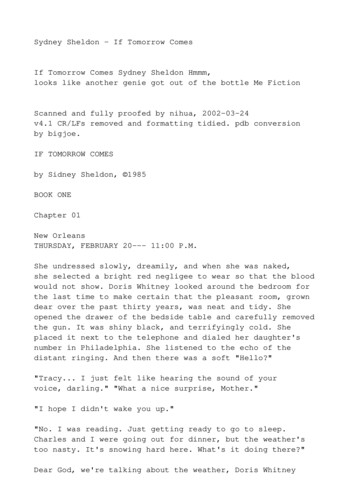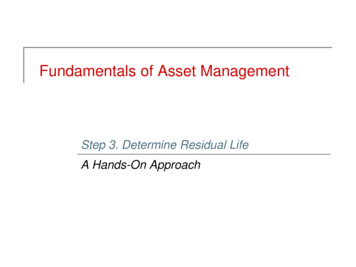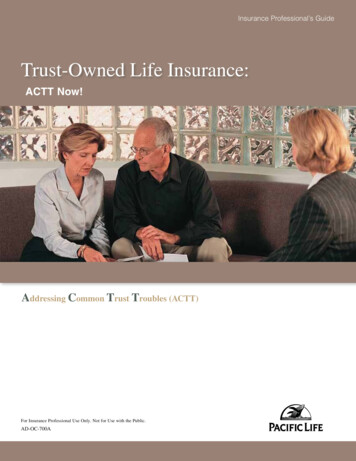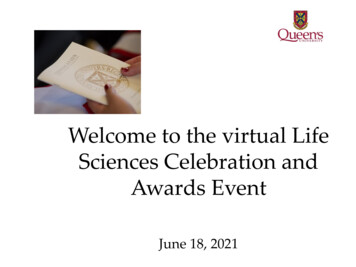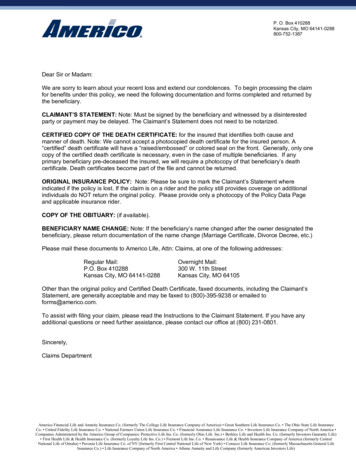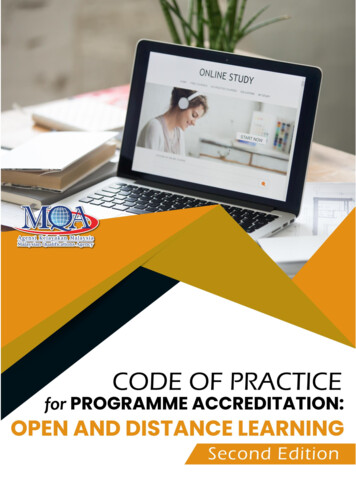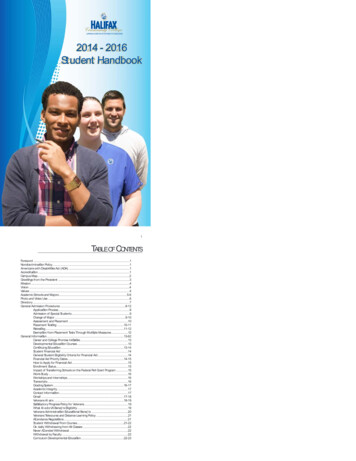
Transcription
LEARNINGCOMES TOLIFEINPURSUITOFEXCELLENCE2014 - 2016Student HandbookiTABLEOF CONTENTSForeword .1NondiscriminaƟon Policy .1Americans with DisabiliƟes Act (ADA) .1AccreditaƟon .1Campus Map .2GreeƟngs from the President .3Mission .4Vision .4Values .4Academic Schools and Majors.5-6Photo and Video Use .6Directory .7General Admission Procedures .8-12ApplicaƟon Process.8Admission of Special Students.9Change of Major .9-10Assessment and Placement .10Placement TesƟng .10-11RetesƟng.11-12ExempƟon from Placement Tests Through MulƟple Measures .12General InformaƟon .13-62Career and College Promise IniƟaƟve .13Developmental EducaƟon Courses .13ConƟnuing EducaƟon.13-14Student Financial Aid .14General Student Eligibility Criteria for Financial Aid .14Financial Aid Priority Dates.14-15How to Apply for Financial Aid.15Enrollment Status.15Impact of Transferring Schools on the Federal Pell Grant Program .15Work-Study .16Workships and Internships.16Transcripts.16Grading System .16-17Academic Integrity .17Contact InformaƟon.17Gmail .17-18Veterans Aī airs .18-19SaƟsfactory Progress Policy for Veterans .19What Aī ects VA BeneĮ ts Eligibility.19Veterans AdministraƟon EducaƟonal BeneĮ ts .20Veterans Telecourse and Distance Learning Policy .21AƩendance RegulaƟons .21Student Withdrawal From Courses.21-22Oĸ cially Withdrawing from All Classes .22Never AƩended Withdrawal .22Withdrawal by Faculty .22Curriculum Developmental EducaƟon .22-23
iiDevelopmental Course Load .23Grading System for Developmental Studies.23Change of Grades.24CompuƟng Quality Point Average.24Student Conduct .24-25Student Conduct Charges .25-26Student Conduct Policy 510.00 Codes and ViolaƟons .26-27Cyber Conduct .27Student Appeal .28Temporary Disciplinary AcƟon .28Student Grievance Procedure .28DeĮ niƟons.29Informal ResoluƟons.30Student Grievance3 Procedure/ Due Process. 30-31Formal ResoluƟons .31Level I .31Level II .31Level III . 32510.02 Student Grievance Procedures and .32-33Right to Appeal Harassment GrievanceHarassment Grievance Level I .33Harassment Grievance Level II .33Harassment Grievance Level III .33Student Property.34Smoking .34-35Drugs and Alcohol .36-37Dress Code .37Cell Phones and Electronic Devices .37Laptop Computers .38New Student OrientaƟon .38Academic Advising .38Tutorial Services.39-40Counseling Center Services.40-41Disability Services .41-42Career and College Services/Disability Services .42-43Job Placement .43Student Support Services.43PRIDE Male Mentoring Program .43-44Student Auxiliary Services.44Library Services.43Electronic Resources Center.44-45Use of Computers .45Computer Use RegulaƟons .45Guidelines .45-46Disclaimer.46Student Success Center.46-47SSC Available Services for Faculty .48SSC Student Responsibility .48Distance Learning.49Online OrientaƟon .49HCC Gmail & Blackboard Accounts.49-50Types of Distance Learning Courses.50iiiDistance Learning Homepage .50Bookstore.51Textbook Refunds/Exchanges .51Textbook Buybacks.51Student ID Cards .51Student Center.51-52Circle Cafe’.52Student Room .52Childcare Services .52Student OrganizaƟons .52-54Student Government AssociaƟon .53Human Services Club .53Early Childhood Club .53Phi Beta Lambda .54Phi Theta Kappa .54Women of Excellence.54Academic Calendar & Class Schedules .54Campus Police/ Security.54Weapons on Campus.54-55Emergency Response Plan .55ContacƟng a Student in an Emergency .55Responding to An AcƟve Shooter on Campus .55-58Weather Delays and CancellaƟons.58Inclement Weather .58Motor Vehicles.58Student RelaƟonships.58-59Lost and Found.59Sex Oī ender Law (Sex Oī enders on Community College .59-60Campuses)TuiƟon and Student Fees .60TuiƟon Refunds .60Student Accounts Receivable.609Who Can Answer My QuesƟons?.61FAQ’s.62-63
1ForewordThis handbook provides students with addiƟonal informaƟon about HalifaxCommunity College--its policies, procedures, and primary acƟviƟes. Items in thishandbook highlight and reinforce informaƟon presented in the HCC AcademicCatalog, aswell asother publicaƟonsissued by the College. Thishandbook describesHalifax Community College’s policies, procedures, and services, which apply to allstudents. Students are responsible for knowing and adhering to its content.NondiscriminaƟon Policy NoƟceHalifax Community College is an aĸ rmaƟve acƟon, equal opportunity insƟtuƟonand welcomes students and employees without regard to race, color, naƟonalorigin, religion, sex, age, or disability.Americans with DisabiliƟes Act (ADA)Halifax Community College complies with the regulaƟons of the Americanswith DisabiliƟes Act. Anyone with special needs should contact the CounselingDepartment, Room 312, for informaƟon on disabiliƟes, services, and faciliƟes.AccreditaƟonHalifax Community College is accredited by the Commission on Colleges of theSouthern AssociaƟon of Colleges and Schools [1866 Southern Lane, Decatur,Georgia 30033-4097; 404-679-4501] to award the associate degree. The followingagencies accredit or approve speciĮ c programs:North Carolina State Board of Community CollegesNorth Carolina Board of NursingNaƟonal AccrediƟng Agency for Clinical Laboratory Sciences (NAACLS);8410 West Bryn Mawr Avenue, Suite 670, Chicago, IL 60631; 773-714-8880American Dental AssociaƟon; 211 E. Chicago Ave., Chicago, IL 60611North Carolina Department of JusƟce, Criminal JusƟce Standards DivisionNorth Carolina State Board of CosmeƟc ArtsHalifax Community College issues this student handbook to furnish prospecƟvestudents and other interested people with informaƟon about the insƟtuƟon andits programs. The informaƟon contained in this student handbook is correct at theƟme of prinƟng. Changes in administraƟve rules, requirements, and regulaƟonsmay occur during the year.2CAMPUSMAP
4MissionHCC strives to meet the diverse needs of our community by providing highquality, accessible, and aī ordable educaƟon and services for a rapidly changingand globally compeƟƟve marketplace.VisionHCC will conƟnue to be a catalyst for educaƟonal, cultural, and economicprogress in the Roanoke Valley by anƟcipaƟng and responding to the needs of anevolving global community.ValuesIntegrity: We uphold the ethical standards of truth, humility, respect, and fairness to allpeople.Service: We acƟvely support service to our community through our parƟcipaƟon andcollaboraƟon in worthwhile community service acƟviƟes.ConƟnuing Learning: We value the process of teaching and learning by maintaining aculture of academic excellence in a student-centered environment.CollaboraƟon: We promote the combined eī orts of all stakeholders in accomplishingour common goals by fostering open communicaƟons and strengthening ourpartnerships with our many stakeholders.Accessibility: We provide pathways and support to all who seek educaƟonalopportuniƟes, personal enrichment or a higher quality of life.InnovaƟon: We embrace new and creaƟve approaches to improve the quality of oureducaƟon and services for our community.Diversity: We believe an appreciaƟon of diī erences adds to the richness of ourstudents, the learning environment and the personal development of our enƟrecommunity.Accountability: We take responsibility for conƟnuous quality improvement, studentsuccess and focused outcomes, serving the expressed needs of our community, uƟlizingour Į scal and educaƟonal resources wisely, providing quality educaƟon and services byplanning strategically and making data-driven decisions.
5ACADEMICSCHOOLSAND MAJORSThere are Į ve academic schools at Halifax Community College oī ering a broadrange of curriculum programs leading to cerƟĮ cates, diplomas, and associatedegrees.School of Arts and SciencesAssociate in ArtsAssociate in ScienceAssociate in General EducaƟonSchool of BusinessAdverƟsing & Graphic Design Associate in Applied ScienceAdverƟsing & Graphic Design - Computer Graphics CerƟĮ cateAdverƟsing & Graphic Design - Graphic Design CerƟĮ cateAdverƟsing & Graphic Design - Career & College Promise CerƟĮ cateBusiness AdministraƟon AASBusiness AdministraƟon DiplomaBusiness AdministraƟon CerƟĮ cateComputer InformaƟon Technology AASComputer InformaƟon DiplomaMedical Oĸ ce AdministraƟon AASMedical Oĸ ce AdministraƟon DiplomaMedical Oĸ ce AdministraƟon Medical Coding & Billing CerƟĮ cateOĸ ce AdministraƟon Technology AASOĸ ce AdministraƟon Technology DiplomaOĸ ce AdministraƟon Technology CerƟĮ cateSchool of Legal and Public ServicesBasic Law Enforcement Training CerƟĮ cateCriminal JusƟce Technology AASCosmetology AASCosmetology DiplomaEarly Childhood EducaƟon AASGreenhouse & Grounds Maintenance CerƟĮ cateHuman Services Technology AASParalegal Technology AASParalegal Technology CerƟĮ cateParalegal Technology - Career & College Promise CerƟĮ cate6School of VocaƟonal and Industrial TechnologyAutomoƟve Systems Technology AASAutomoƟve Systems Technology DiplomaAutomoƟve Systems Technology-Basic AutomoƟve CerƟĮ cateAutomoƟve Systems Technology-Advanced AutomoƟve CerƟĮ cateAutomoƟve Systems Technology - Career & College Promise CerƟĮ cateElectrical Systems Technology CerƟĮ cateFood Service Technology CerƟĮ catePlumbing CerƟĮ cateMasonry CerƟĮ cateIndustrial Systems Technology AASIndustrial Systems Technology DiplomaIndustrial Systems Technology CerƟĮ cateIndustrial Systems Technology - Career & College Promise CerƟĮ cateWelding Technology DiplomaWelding Technology CerƟĮ cateWelding Technology - Career & College Promise CerƟĮ cateSchool of Nursing and Allied HealthNursing Associate DegreeDental Hygiene Associate DegreeMedical Laboratory Technology Associate DegreePracƟcal Nursing DiplomaPhlebotomy CerƟĮ catePhoto and Video UseHCC does not collect photo/ video release forms. Instead, the College assumesthat faculty, staī , and students are the best resources for markeƟng the College.SƟll or video photo shoots may be informal (candid photos of campus scenes,performances, events, or acƟviƟes) or formal (planned visits to classrooms,headshots or video shoots on campus). All photographic/ video images becomethe property of HCC. Public RelaƟons & MarkeƟng staī members add the photosor video footage to the College’s library of images, which becomes a resourcefor the College’s online and print publicaƟons. Students parƟcipaƟng in a photoshoot are giving their permission for their image to be used as the College seesĮ t. Students may opt out if that is their choice. If a student does not wish to bephotographed but fails to idenƟfy himself or herself to the photographer, it willbe very diĸ cult to exclude that person from the resulƟng images. Concerns aboutthe uses of individual images may be communicated to the Public RelaƟons &MarkeƟng Oĸ ce staī who will resolve individual complaints while sƟll meeƟngthe insƟtuƟonal goals of visually represenƟng the College.
7DIRECTORYMain NumberAdmissionsBookstoreBusiness Oĸ ceCampus Police Oĸ cerCashierConƟnuing EducaƟonCounseling or Disability ServicesDean of Curriculum ProgramsDean of Student ServicesDistance LearningFinancial AidTitle III & Sponsored ProgramsStudent Success Center (SSC)Learning Resource Center (LRC; library)PresidentRegistrar/ VA ServicesStudent Accounts ReceivableStudent Government AssociaƟonStudent ServicesStudent Support ServicesTesƟng/Job PlacementVice President of Academic Aī airs252-536-2551 /252-536-7225 52-536-7216 /252-536-7207 /252-536-7251 /252-536-7232 /252-536-7299252-538-4334252-536-5464252-536-7204 /252-536-7236 /252-536-6399252-536-7221 /252-536-7205252-536-7298252-536-7232252-536-7229 /252-536-7254252-536-7226536-4221536-7220 / 538-4301536-7212 / 536-7261536-7203536-7245536-6386538-4328536-7237 / 536-7380536-7227536-7290 / 536-63598GENERAL ADMISSIONPROCEDURESApplicaƟon ProcessThe procedures listed below must be followed for admission to a curriculumprogram and must be completed before oĸ cial acceptance is granted:1. Submit an applicaƟon. The applicaƟon for admission is obtained from theOĸ ce of Enrollment Management or online and must be submiƩed to theAdmissions Oĸ ce with suĸ cient informaƟon to determine state residency.2. Submit a photocopy of your signed Social Security card.3. Students seeking admission into an Associate in Arts, Associate in Science,Associate in General EducaƟon, Associate in Applied Science, diplomaprogram or certain cerƟĮ cate programs (cosmetology, phlebotomy andBLET) must be a high school graduate and submit oĸ cial high schooltranscripts or an oĸ cial copy of their GED scores.4. Students who are 18 years of age or older, but have not graduated highschool may enroll as a special student. Note: special students are not eligiblefor Į nancial aid or veterans’ beneĮ ts.5. Submit oĸ cial transcripts from previously aƩended colleges if transfer creditis desired.6. Meet with a counselor. Students are assisted in selecƟng an appropriateprogram of study based on their desires and academic abiliƟes. Counselorsare available throughout each semester to assist students with educaƟonaland career goals and are always available to students with academicconcerns.7. Complete college placement tests. The placement test is administered toall students prior to their Į rst semester registraƟon. The purpose of theplacement test is to enroll students in the appropriate English, reading,math, or algebra courses based on their prior academic preparaƟons.SelecƟon of students for each allied health program is based on admissionsand other program speciĮ c criteria. Students who have an AASdegreeor higher are exempt from the test, except for programs with selectedadmissions.8. Have a personal interview with the tesƟng coordinator to review andinterpret placement test scores. The counselor can evaluate the student’sapƟtude and capability to pursue a parƟcular program of study. Thestudent will have the opportunity to ask quesƟons about the school and itsprograms.9. Meet with an advisor. Students meet with assigned academic advisors eachsemester to complete class schedules. Placement test results and/or transfercredits may be used when appropriate.
9Admission of Special StudentsApplicants who do not complete the admissions procedures outlined abovemay register as a special student. This includes students 18 years of age or olderwho are not high school graduates. To be admiƩed as a special student, theapplicant needs only to submit a completed applicaƟon and a signed photocopyof their Social Security card; however, upon a later decision to pursue a degree,diploma, or cerƟĮ cate at the College, special students will be required to submitproof of an oĸ cial high school transcript and/or copy of their GED scores andmeet certain placement criteria.Special students must meet course prerequisites and/or co-requisites and/orprovide oĸ cial college transcripts showing that the prerequisites and/or corequisites have been met or take the college placement test with saƟsfactoryscores.Special students and students in cerƟĮ cate programs are NOT ELIGIBLE forĮ nancial aid or veterans’ beneĮ ts. The student must declare a major aŌer taking15 hours in a major.Students must score 500 or higher in each area (criƟcal reading/ wriƟng and/ormath) to be exempt from that porƟon of the placement test.Note: transfer and reentry students must provide oĸ cial transcripts from allinsƟtuƟons aƩended if they desire transfer credit. HCC’s registrar will evaluatethe oĸ cial transcript before any placement tesƟng waiver is granted.Home-schooled applicants must provide oĸ cial high school transcripts for thecourse work completed.Change of MajorStudents wishing to change their majors should complete the following steps:1. Current advisor will print out the Change of Major Form located on FileExchange (HCC FORMS).2. Current advisor will sign oī on the Change of Major Form.3. Student will take signed form to new advisor.4. New advisor will sign oī on the Change of Major Form.5. Student will take the Change of Major Form signed by both advisors to theFinancial Aid Oĸ ce for new curriculum program evaluaƟon (if you are aĮ nancial aid recipient).6. AŌer obtaining current and new advisor signatures on the Change of MajorForm, the student will take the form to the Admissions Oĸ ce.10Students who do not know what they wish to major in or what career they wantto choose should go to the Counseling Center for advisement.Assessment and PlacementPlacement TesƟngHalifax Community College will implement the North Carolina DiagnosƟcAssessment and Placement (NC-DAP) test to assess students’ English, reading,and math college readiness skills. The test will be administered to studentswho do not meet the high school grade point average or ACT/ SAT placementcriteria included in the MulƟple Measures for Placement Policy adopted by theState Board of Community Colleges on February 15, 2013. A placement tesƟngprogram for all students is coordinated through the dean of student services.Students must complete the following in order to test: Have an applicaƟon on Į le prior to taking the placement tests. Submit oĸ cial copies of high school transcript(s) to an admissions oĸ cer. Provide a copy of signed Social Security card to an admissions oĸ cer. Get a tesƟng referral form from an admissions oĸ cer. Call the tesƟng coordinator to schedule a tesƟng appointment. Present a picture ID and a tesƟng referral form on the day of tesƟng.Special note: Acceptable forms of idenƟĮ caƟon include, but are not limited to,driver’s license, learner’s permit, and school ID. In tesƟng situaƟons, use of cellphones or similar communicaƟon devices may lead to a charge of academicdishonesty.The North Carolina DiagnosƟc Assessment & Placement - English/ Readingplacement test is composed of three components: Reading (mulƟple choice) Revising & EdiƟng WriƟng (mulƟple choice) WritePlacer (automaƟc essay scoring)The test is administered and interpreted by Student Services. WritePlacer essaysare electronically scored by the Intelligent Essay Assessor that is powered by theKnowledge Analysis Technologies engine. Essays are occasionally reported as“pending,” and will require a human reader to hand score. If the essay is scoredby hand, it will take 24 hours to generate a score.The North Carolina DiagnosƟc Assessment & Placement - Math test provides sixtest “strands” that match the content of the math modules in DMA 010 – 060 asfollows:
11 DMA 010 - OperaƟons with IntegersDMA 020 - FracƟons and DecimalsDMA 030 - ProporƟons, RaƟos, Rates and PercentagesDMA 040 - Expressions, Linear EquaƟons and Linear InequaliƟesDMA 050 - Graphs and EquaƟons of LinesDMA 060 - Polynomials and QuadraƟc ApplicaƟonsNorth Carolina DiagnosƟc Assessment & Placement tests are valid for Į veyears. However, students are allowed to retest once within a 12-month period.Students who do not place into DMA 010 will be allowed to remediate in theBasic Skills Lab and test with TABE to determine competence in required skillsand admiƩance into DMA 010. Once the student passes this test, the studentwill enroll in DMA 010 and all subsequent modules.IMPORTANT NOTE:North Carolina DiagnosƟc Assessment & Placement (NC-DAP) tests is a suiteof tests that determines a student’s knowledge in math, reading and wriƟngas he or she prepares to enroll in college-level courses. NS-DAP is used toidenƟfy strengths and weaknesses in each subject area and to help improvethe student’s skills through interacƟve online learning tools. The results of theassessment, in conjuncƟon with the academic background, goals and interestsof the student, are used by academic advisors and counselors for placement inthe appropriate college courses that meet the student’s skill level. NC-DAP testquesƟons are based on the student’s responses to previous quesƟons. QuesƟonswill either increase or decrease in diĸ culty depending on how a st
Registrar/VA Services 252-536-7221 / 536-7227 Student Accounts Receivable 252-536-7205 Student Government AssociaƟon 252-536-7298 Student Services 252-536-7232 Student Support Services 252-536-7229 / 536-7290 / 536-6359 Tes Ɵng/Job Placement 252-536-7254 Vice President of Academic A īairs 252-536-7226 7 GENERAL ADMISSION PROCEDURES
